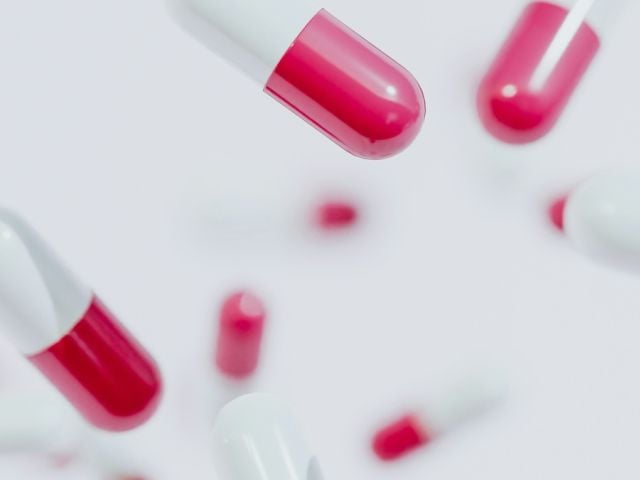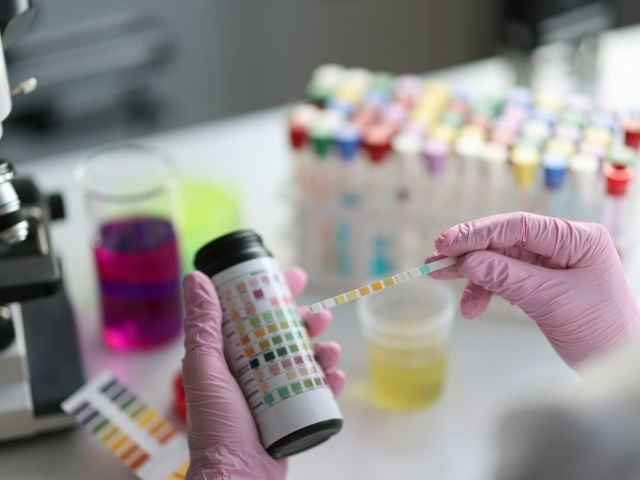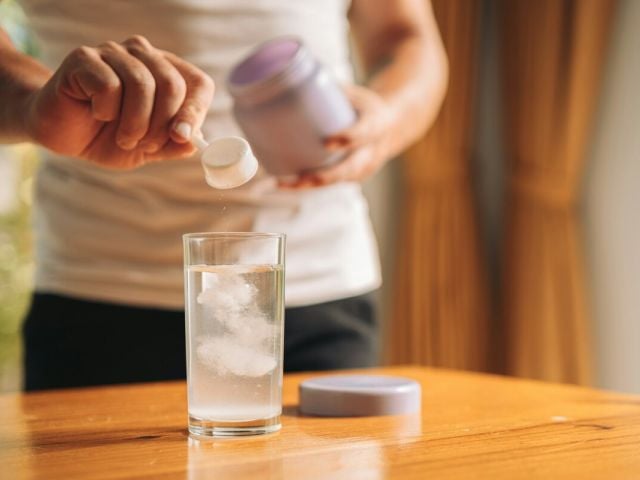
10 Supplements Studies Show Reduce Cortisol Levels
Cortisol levels that stay high for weeks or months can negatively impact your body in multiple ways. This stress hormone triggers weight gain, disrupts sleep, and leaves you feeling anxious and exhausted.
Clinical research shows that specific supplements can help regulate cortisol levels naturally. We’ll examine the 10 best supplements to reduce cortisol with solid scientific backing from human trials.
Why High Cortisol Levels Matter for Your Health
Cortisol serves an important role in your body’s stress response. It helps you handle immediate threats by increasing blood sugar and sharpening focus.
But cortisol isn’t just a “stress hormone.” This vital hormone follows a natural daily rhythm, peaking in the morning to promote wakefulness and gradually declining at night.
Your body relies on cortisol to maintain blood glucose levels, regulate blood pressure, and provide anti-inflammatory effects. Problems arise when these levels stay chronically elevated.
High cortisol contributes to:
- Weight gain around your midsection
- Disrupted sleep patterns and insomnia
- Weakened immune system function
- Increased inflammation throughout your body
- Memory problems and brain fog
How These Supplements Help Lower Cortisol
Each of the 10 cortisol-lowering supplements below work by a slightly different mechanism to help lower elevated cortisol levels in your body.
Some supplements act directly on the hypothalamic-pituitary-adrenal axis. This is the part of your brain that regulates your body’s production and release of cortisol when it is under stress.
Other supplements help your body metabolize and clear cortisol from the body more quickly. A few supplements work by calming your nervous system down, which decreases the signals that are sent out in the first place to start cortisol production.
And, since the gut is so intimately connected with the brain, oxidative stress and inflammation can also work to keep cortisol levels elevated, so any supplement that helps decrease oxidative stress and inflammation also helps bring your body’s stress response system back into balance.
10 Evidence-Based Supplements That Lower Cortisol Levels
Based on clinical research, these 10 supplements may help reduce cortisol through different mechanisms and with varying levels of scientific support.
1. Ashwagandha
Ashwagandha is by far the most researched supplement for lowering cortisol. It’s an adaptogen that directly influences your stress response.
In several randomized controlled trials, ashwagandha decreased serum cortisol levels by up to 33% in people with stress. In a 2012 study, 64 adults were given 600 mg per day for 60 days, which significantly reduced cortisol levels compared to placebo.
The secret is standardized extracts such as KSM-66. This particular ashwagandha contains key compounds called withanolides. These active components help regulate stress-induced proteins and normalize cortisol production.
Clinical dosage: 225-600 mg daily of standardized extract
Study duration: 30-90 days for best results
2. Magnesium
Magnesium works differently than other supplements to lower cortisol. Instead of blocking production, it helps your body clear cortisol more efficiently.
Magnesium has been found to activate 11β-HSD2, an enzyme that converts active cortisol into inactive cortisone. In a 24-week clinical trial, taking 350 mg per day significantly reduced 24-hour urinary cortisol excretion.
Magnesium also promotes activity in your parasympathetic nervous system, the “rest and digest” mode that counters the stress response responsible for cortisol production.
Clinical dosage: 350 mg elemental magnesium daily
Best forms: Magnesium citrate or glycinate for better absorption
3. Omega-3 Fatty Acids
Omega-3s help manage cortisol in a variety of ways. For one, they have anti-inflammatory and anti-stress effects on your central nervous system.
Omega-3 supplementation has been shown in trials to decrease both baseline cortisol and cortisol responses to stressors. For instance, 7.2 g of fish oil per day was shown to blunt cortisol release during mental stress tasks.
Inflammation plays a role here as well. Omega-3s are often used in brain health formulas because stress in the brain (via inflammation) can trigger cortisol release. This can cause a feedback loop of stress -> inflammation -> more stress.
Clinical dosage: 300 mg to 7.2 g daily (EPA + DHA combined)
Context: Effective for both chronic elevation and acute stress response
4. Probiotics
Your gut microbiome talks directly to your stress response system. Probiotics lower cortisol by supporting the intestinal barrier and decreasing inflammatory signals.
A 2024 meta-analysis of 46 studies found that probiotic supplementation markedly decreased cortisol levels. The results varied widely between different strains and populations though.
Single-strain probiotics were more effective than multi-strain products. The effect was stronger in healthy adults than in patients with diagnosed conditions.
Key consideration: Strain-specific effects mean not all probiotics work equally well
5. L-Theanine
L-Theanine is an amino acid found in green tea that promotes relaxed alertness. It works by blocking glutamate receptors in your brain, reducing neuronal excitement.
Studies show L-theanine works well for reducing immediate reactions to stress. In one crossover study, 200 mg of theanine was found to significantly blunt cortisol levels after a mental stress challenge.
But L-theanine appears less effective for chronically elevated cortisol levels. It works best when taken before anticipated stressful situations. This amino acid naturally found in green tea promotes calm focus without drowsiness.
Clinical dosage: 200 mg as a single dose
Best timing: 30-60 minutes before stressful events
🧬 MORE INSIGHTS
- Daily stress taking a toll on your cells? These antioxidant supplements for oxidative stress can help your body fight back naturally.
- Your cells work hard and need support to stay healthy. Find the best supplements to support cellular repair and recovery.
- Dealing with persistent fatigue? Science shows which chronic fatigue supplements actually work and which ones waste your money.
6. Bacopa Monnieri
Bacopa monnieri combines nootropic and adaptogenic properties. This Ayurvedic herb helps reduce cortisol while supporting memory and cognitive function.
Clinical trials show bacopa can reduce cortisol in both acute and chronic stress situations. A 12-week study found that 300 mg daily substantially lowered serum cortisol while improving memory and reducing anxiety.
The active compounds called bacosides provide antioxidant and anti-inflammatory effects in the brain. This may explain why bacopa helps with both stress and cognitive performance at the same time.
Clinical dosage: 300-640 mg daily of standardized extract
Study duration: 8-12 weeks for optimal benefits
7. Vitamin C
Your adrenal glands contain some of the highest concentrations of vitamin C in your body. This essential nutrient serves as a cofactor for cortisol synthesis and regulation.
Research shows vitamin C supplementation can help lower cortisol levels. One clinical trial found that 1,000 mg daily for two months reduced cortisol by 35% compared to just 10% in the control group.
Vitamin C also helps combat oxidative stress markers that can keep cortisol elevated. The antioxidant effects support overall adrenal gland health and proper stress hormone regulation.
Clinical dosage: 1,000 mg daily
Duration: At least 8 weeks for measurable effects
Interested in Vitamin C Support?
Jinfiniti’s Natural Vitamin C combines whole food vitamin C from amla extract with bioavailable zinc chelate in one targeted formula. Instead of synthetic vitamin C that causes issues for some, you get 100% natural vitamin C with enhanced bioavailability plus immune-supporting zinc.
8. Nicotinamide and D-Ribose Combo
The NAD+ enhancer, nicotinamide, paired with the monosaccharide D-ribose can help lower cortisol by increasing energy production in cells.
This nicotinamide/ribose stack was shown in a clinical study at the University of Washington to significantly lower salivary cortisol in healthy middle-aged adults. Participants in the study were given a supplement called RiaGev that contained 1280 mg D-ribose, 240 mg nicotinamide, and 480 mg palm oil twice per day.
The supplementation protocol lasted 8 days, during which time NAD+ levels were found to be elevated by 10.4% and NADP+ was elevated by 27.6%. NAD+ and NADP+ are major cellular energy currency, which also play a direct role in how your cells regulate stress responses.
The cortisol reduction likely stems from improved cellular energy status. When your cells have adequate energy resources, they don’t trigger the same stress signals that lead to cortisol release.
This combination also increased glutathione antioxidant levels by 11.6%, which helps combat the oxidative stress that can keep cortisol elevated. The benefits of NAD extend beyond just energy production to include stress regulation.
Clinical dosage: 1280 mg D-ribose + 240 mg nicotinamide twice daily
Study duration: 8 days for measurable effects
Want to Lower Cortisol AND Boost NAD+?
Jinfiniti’s Vitality↑® NAD+ Booster contains d-ribose with nicotinamide, creatine, and niacinamide in a clinically validated formulation. Rather than guessing with individual ingredients, you get a research-backed combination designed to work across multiple energy pathways.
9. Creatine
Creatine shows specific promise for reducing cortisol spikes triggered by high-intensity exercise. This supplement works by maintaining cellular energy stores during physical stress.
A study in competitive swimmers found that six days of creatine loading significantly suppressed post-exercise cortisol response. Swimmers taking 20 g daily had cortisol levels of 15.5 μg/dL after intense training compared to 18.33 μg/dL in the control group.
The mechanism relates to energy preservation. During intense exercise, your body normally breaks down muscle protein to fuel ongoing activity, triggering cortisol release. Creatine and ATP work together to maintain energy stores, reducing the need for this catabolic response.
This makes creatine particularly valuable for athletes and anyone doing high-intensity training. By preventing energy depletion, creatine helps maintain anabolic conditions even during demanding workouts.
Clinical dosage: 20 g daily for 6 days (loading protocol), then 3-5 g daily for maintenance
Best for: Exercise-induced cortisol spikes and athletic performance
Ready for Next-Level Creatine?
Jinfiniti’s Creatine ATP supplement provides 4g creatine monohydrate with 400mg disodium ATP in each serving. Beyond basic creatine, you get the cognitive and stress-response benefits of creatine plus direct ATP for immediate cellular energy support.
10. Phosphatidylserine
Phosphatidylserine (PS) shows promise for reducing exercise-induced cortisol, but research results depend heavily on the source material.
Early studies using PS derived from cow brain tissue showed impressive results. Athletes taking 800 mg daily experienced a 20% reduction in exercise-induced cortisol spikes.
But modern supplements use plant-based sources due to safety concerns. Studies with soy or cabbage-derived PS show little to no effect on cortisol levels.
The issue: Plant-based PS appears to lack the molecular structure needed for cortisol reduction
Clinical dosage: 400-800 mg daily (though effectiveness questionable with current sources)
Comparison Table: Supplements to Lower Cortisol
| Supplement | Evidence Level | Dosage Range | Primary Mechanism | Best For |
|---|---|---|---|---|
| Ashwagandha | Strong | 225-600 mg/day | HPA axis modulation | Chronic stress |
| Magnesium | Strong | 350 mg/day | Cortisol clearance | Baseline regulation |
| Omega-3s | Strong | 300 mg-7.2 g/day | Anti-inflammatory | Acute + chronic stress |
| Probiotics | Promising | Strain-dependent | Gut-brain axis | Inflammation-related stress |
| L-Theanine | Promising | 200 mg/dose | Neurotransmitter balance | Situational stress |
| Bacopa Monnieri | Promising | 300-640 mg/day | Adaptogenic effects | Cognitive stress |
| Vitamin C | Promising | 1,000 mg/day | Adrenal support | General stress support |
| Nicotinamide + D-Ribose | Promising | 1280mg + 240mg twice daily | NAD+ enhancement | Cellular energy stress |
| Creatine | Promising | 20g loading/3-5g maintenance | Energy preservation | Exercise-induced stress |
| Phosphatidylserine | Conflicting | 400-800 mg/day | HPA axis blunting | Exercise stress (limited) |
Natural Ways to Reduce Cortisol
Supplements work best when combined with lifestyle changes that address the root causes of elevated cortisol.
- Sleep plays a major role in cortisol regulation. Getting 7-9 hours of quality sleep helps reset your stress hormone cycles. Going to bed and waking up at consistent times strengthens this natural rhythm.
- Regular exercise reduces cortisol, but avoid overtraining. Moderate activities like walking, yoga, or swimming work better than intense daily workouts that can spike stress hormones.
- Deep breathing exercises activate your parasympathetic nervous system. Try the 4-7-8 technique: inhale for 4 counts, hold for 7, exhale for 8. Practice this for 5 minutes daily.
- Social connections buffer stress responses. Spending time with supportive friends and family members naturally lowers cortisol levels.
- Time in nature also helps. Even 20 minutes outdoors can reduce stress hormones and improve your mood.
Consider meditation or mindfulness practices. Research shows these techniques can lower both acute stress responses and baseline cortisol levels over time.
Safety Considerations and Professional Guidance
Most cortisol-reducing supplements are well-tolerated, but some important safety notes apply.
Ashwagandha may interact with thyroid medications and can cause liver issues in rare cases. Avoid during pregnancy due to potential effects on fetal development.
High-dose omega-3 supplementation can increase bleeding risk if you take blood-thinning medications. Start with lower doses and monitor for any unusual bruising.
Magnesium can cause digestive upset at higher doses. Chelated forms like magnesium glycinate tend to be gentler on your stomach.
Important: Consult your healthcare provider before starting any new supplement regimen, especially if you take medications or have health conditions.
Supporting Your Body’s Natural Stress Response
Supplements are most effective when used as part of a holistic approach to stress management. Exercise, good sleep, and stress management techniques can help the body deal with cortisol better.
Try measuring your cortisol levels before and after to see if the supplement is working for you. Many people find the most relief when they use targeted supplements with lifestyle changes.
Cortisol is not all bad and has important functions in the body. We don’t want to completely suppress it, but rather reset the body’s patterns and prevent long-term elevation.
The above 10 supplements are the most evidence-based ways to manage cortisol naturally. Begin with those with the best evidence, such as ashwagandha and magnesium. Then, consider adding a few others that make sense for you and that you respond well to.

Get weekly health insights and exclusive offers by joining our newsletter.










